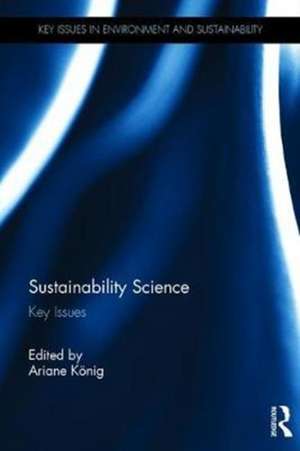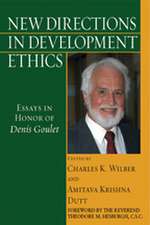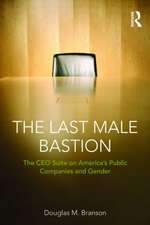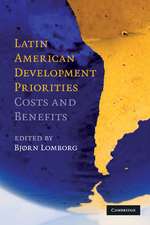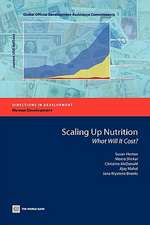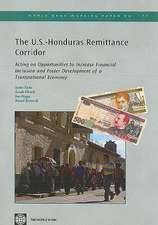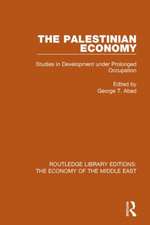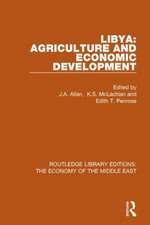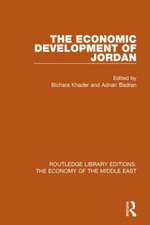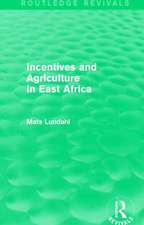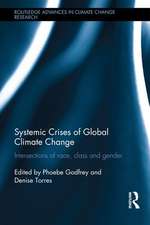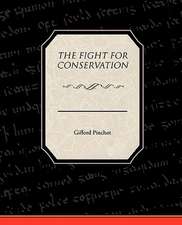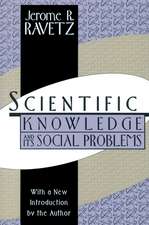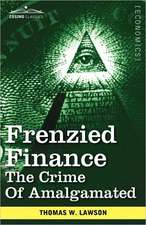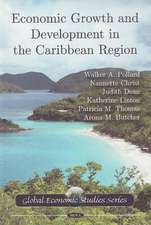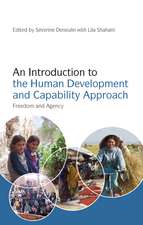Sustainability Science: Key Issues: Key Issues in Environment and Sustainability
Editat de Ariane König, Jerome Ravetzen Limba Engleză Hardback – 21 noi 2017
This book equips readers with a better understanding of how one might actively design, engage in, and guide collaborative processes for transforming human-environment-technology interactions, whilst embracing complexity, contingency, uncertainties, and contradictions emerging from diverse values and world views. Each reader of this book will thus have guidance on how to create and/or engage in similar initiatives or courses in their own context.
Sustainability Science: Key Issues is the ideal book for students and researchers engaged in problem and project based learning in sustainability science.
| Toate formatele și edițiile | Preț | Express |
|---|---|---|
| Paperback (1) | 327.72 lei 6-8 săpt. | |
| Taylor & Francis – 22 noi 2017 | 327.72 lei 6-8 săpt. | |
| Hardback (1) | 1109.18 lei 6-8 săpt. | |
| Taylor & Francis – 21 noi 2017 | 1109.18 lei 6-8 săpt. |
Preț: 1109.18 lei
Preț vechi: 1352.65 lei
-18% Nou
Puncte Express: 1664
Preț estimativ în valută:
212.30€ • 218.78$ • 179.23£
212.30€ • 218.78$ • 179.23£
Carte tipărită la comandă
Livrare economică 04-18 martie
Preluare comenzi: 021 569.72.76
Specificații
ISBN-13: 9781138659278
ISBN-10: 1138659274
Pagini: 396
Ilustrații: 84
Dimensiuni: 156 x 234 mm
Greutate: 0.45 kg
Ediția:1
Editura: Taylor & Francis
Colecția Routledge
Seria Key Issues in Environment and Sustainability
Locul publicării:Oxford, United Kingdom
ISBN-10: 1138659274
Pagini: 396
Ilustrații: 84
Dimensiuni: 156 x 234 mm
Greutate: 0.45 kg
Ediția:1
Editura: Taylor & Francis
Colecția Routledge
Seria Key Issues in Environment and Sustainability
Locul publicării:Oxford, United Kingdom
Public țintă
Postgraduate and UndergraduateCuprins
Introduction
Chapter 1. Sustainability science as a transformative social learning process Ariane König
Chapter 2. Flowers of resistance: Citizen science, ecological democracy and the transgressive education paradigm Arjen E.J. Wals, Michael A. Peters
Part I. Embracing complexity and alternative futures: Conceptual tools and methods
Chapter 3. Systems approaches for transforming social practice: Design requirements Ariane König
Chapter 4. Cognitive pitfalls in dealing with sustainability Philipp Sonnleitner
Chapter 5. Escaping the complexity dilemma Barry Newell, Katrina Proust
Chapter 6. Exploring alternative futures with scenarios Gerard Drenth, Shirin Elahi, Ariane König
Chapter 7. Social technology and Theory U: Co-creating actionable knowledge for
leadership Isabel Page
Chapter 8. Staging design-thinking for sustainability in practice: Guidance and watch-outs Kilian Gericke, Boris Eisenbart, Gregor Waltersdorfer
Part II. What might transformations look like? Sectoral challenges and interdependence
Chapter 9. Can ecosystem services help agricultural transitions? Nicolas Dendoncker, Emilie Crouzat
Chapter 10. Food systems and human ecology: An overview Federico Davila, Robert Dyball
Chapter 11. Energy: Physical and technical basics Susanne Siebentritt
Chapter 12. Urban energy transitions from innovations in green building Julia Affolderbach, Bérénice Jung-Preller, Christian Schulz
Chapter 13. Democratising renewable energy production: A Luxembourgish perspective Kristina Hondrila, Simon Norcross, Paulina Golinska, Vladimir Broz, Aydeli Rios, Jules Muller
Chapter 14. Community-based monitoring for improved water governance Kim Chi Tran, Ariane König
Part III. Tracking, steering and judging transformation
Chapter 15. Sustainability indicators: Quality and quantity Jerome Ravetz, Paula Hild, Olivier Thunus, Julien Bollati
Chapter 16. Complex learning Sebastian Manhart
Chapter 17. Uncertainty as a key to sustainability economics Jerome Ravetz
Chapter 18. Post-Script: Heuristics for sustainability science Jerome Ravetz
Chapter 19. Outlook: The changing relationship between citizens and science in the Anthropocene Ariane König
Chapter 1. Sustainability science as a transformative social learning process Ariane König
Chapter 2. Flowers of resistance: Citizen science, ecological democracy and the transgressive education paradigm Arjen E.J. Wals, Michael A. Peters
Part I. Embracing complexity and alternative futures: Conceptual tools and methods
Chapter 3. Systems approaches for transforming social practice: Design requirements Ariane König
Chapter 4. Cognitive pitfalls in dealing with sustainability Philipp Sonnleitner
Chapter 5. Escaping the complexity dilemma Barry Newell, Katrina Proust
Chapter 6. Exploring alternative futures with scenarios Gerard Drenth, Shirin Elahi, Ariane König
Chapter 7. Social technology and Theory U: Co-creating actionable knowledge for
leadership Isabel Page
Chapter 8. Staging design-thinking for sustainability in practice: Guidance and watch-outs Kilian Gericke, Boris Eisenbart, Gregor Waltersdorfer
Part II. What might transformations look like? Sectoral challenges and interdependence
Chapter 9. Can ecosystem services help agricultural transitions? Nicolas Dendoncker, Emilie Crouzat
Chapter 10. Food systems and human ecology: An overview Federico Davila, Robert Dyball
Chapter 11. Energy: Physical and technical basics Susanne Siebentritt
Chapter 12. Urban energy transitions from innovations in green building Julia Affolderbach, Bérénice Jung-Preller, Christian Schulz
Chapter 13. Democratising renewable energy production: A Luxembourgish perspective Kristina Hondrila, Simon Norcross, Paulina Golinska, Vladimir Broz, Aydeli Rios, Jules Muller
Chapter 14. Community-based monitoring for improved water governance Kim Chi Tran, Ariane König
Part III. Tracking, steering and judging transformation
Chapter 15. Sustainability indicators: Quality and quantity Jerome Ravetz, Paula Hild, Olivier Thunus, Julien Bollati
Chapter 16. Complex learning Sebastian Manhart
Chapter 17. Uncertainty as a key to sustainability economics Jerome Ravetz
Chapter 18. Post-Script: Heuristics for sustainability science Jerome Ravetz
Chapter 19. Outlook: The changing relationship between citizens and science in the Anthropocene Ariane König
Recenzii
"Transforming our world into one that is sustainable and desirable and that achieves the UN Sustainable Development Goals is the overarching challenge for humanity today. This book is an important and innovative guide to sustainability science as a transformative, whole system learning process that is essential to achieving this goal." — Professor Robert Costanza, The Australian National University, Australia
"This book will certainly promote the debate on the role of scientific knowledge in sustainability transitions. It convinces by its enlightened perspective on appropriate forms of knowledge production in the 21st century." — Professor Uwe Schneidewind, Wuppertal Institute for Climate, Environment and Energy, Germany
"This book provides a powerful set of concepts and methods that have proved very effective for the participatory development of new perspectives and actionable knowledge on sustainability in practice, on campus and beyond. Whether for course-work or for practice – this book gives clear guidance. It is a gem!" — Associate Professor Maki Ikegami, Hokkaido University, Japan
"This book will certainly promote the debate on the role of scientific knowledge in sustainability transitions. It convinces by its enlightened perspective on appropriate forms of knowledge production in the 21st century." — Professor Uwe Schneidewind, Wuppertal Institute for Climate, Environment and Energy, Germany
"This book provides a powerful set of concepts and methods that have proved very effective for the participatory development of new perspectives and actionable knowledge on sustainability in practice, on campus and beyond. Whether for course-work or for practice – this book gives clear guidance. It is a gem!" — Associate Professor Maki Ikegami, Hokkaido University, Japan
Descriere
Sustainability Science: Key issues is a comprehensive textbook for undergraduates and postgraudates from any disciplinary background studying the theory and practice of sustainability science.
